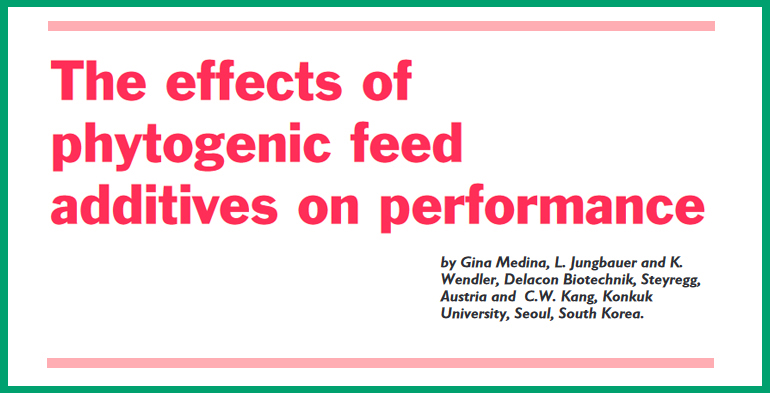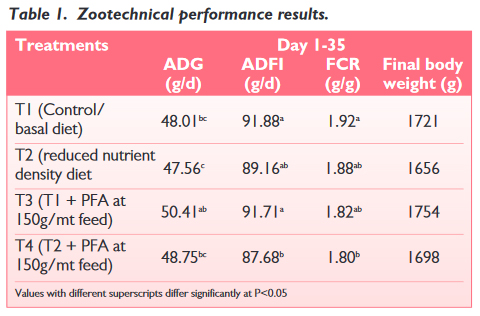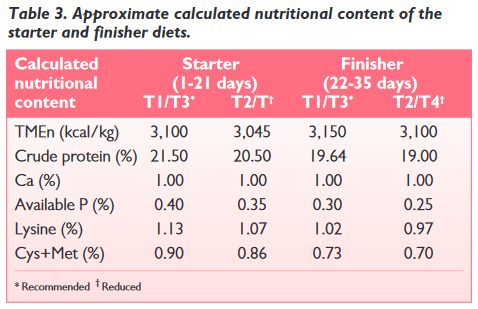
by Gina Medina, L. Jungbauer and K.Wendler, Delacon Biotechnik, Steyregg, Austria and C.W. Kang, Konkuk University, Seoul, South Korea:The poultry industry today faces challenges such as rising feed and production costs apart from the demand of being one major source of animal protein in response to the growing global human population in the perspective of food safety and security.
The ban on the use of in-feed antibiotics in Europe has influenced the increasing awareness of the consumers for food safety and health risk. Documented negative effects of using antibiotic growth promoters in feed triggered the continuous evaluation of in-feed natural growth promoter as an alternative. For the last 10 years, the studies on the use and benefits of natural products in the animal industry increased significantly.
Phytogenic feed additives (PFA) are prod ucts of plant origin that includes herbs, spices, essential oils and other plant extracts. PFA are known to stimulate digestive processes and to improve gut health. Increased nutrient digestibility is reflected in better animal performance.
Different effects of PFA compounds like antioxidative properties (especially monoterpenes thymol and carvacrol, flavonoids, anthcycanes), antimicrobial actions (phenolic compounds being the principal active components), growth promoting efficacy (for example stabilising feed hygiene, by affecting the ecosystem of gastrointestinal microbes, improving digestibility) and improvement of flavour and palatability of feed are reported for broilers.
In several publications Awaad et al. (2010), Jafari et al. (2009) and Liu et al. (2010) show positive effects of plants and plant extracts on the immune response and antibody titers to NDV of broilers. The aim of the study was to determine the effects of phytogenic feed additive (Biostrong 510) on zootechnical performance, immune response and nutrient digestibility in broilers. 
Materials and methods
A total of 840 male day-old Ross 308 male broilers were randomly distributed to four experimental treatments based on a 2x2 factorial design, supplementation of commercial phytogenic feed additive (Biostrong 510) and the recommended and reduced dietary nutrient levels respectively.
Each treatment was replicated seven times with 30 broilers per replicate. The birds were fed with corn/soy starter (1-21 days) and finisher (22-35 days) mash rations for 35 days based on the following treatments:
- Basal/control diet (T1).
- Diet with reduced nutrient level (T2).
- T1 plus 150g of phytogenic feed additive (T3).
- T2 plus 150g of phytogenic feed additive.
The nutritional matrix of the tested PFA was considered in the formulation of the reduced nutrient density diet. Feed and water were provided ad libitum. Parameters measured were feed intake, body weight, feed conversion ratio, mortality, Newcastle disease virus antibody titer and protein and energy digestibility.
Broilers were inoculated with commercially available live NDV vaccine by intra-muscular injection on the 14th day of the experiment.
Blood was taken from the jugular vein from two weeks after injection. Serum samples were analysed for anti NDV antibody titers by ELISA with commercial kits, following the manufacturer’s directions.
Feed samples were analysed for nutritional content. Data were analysed using a randomised complete block design following GLM procedure of SAS and statistical significance at P ≤0.05.



Results and discussion
The overall zootechnical performance effect on body weight, daily gain, feed intake and feed conversion ratio are shown on Table 1. The treatment diets with PFA (T3 and T4) showed numerically higher final body weight than diets without PFA (T1 and T2) by 1.9% and 2.5% respectively.
Reduction on nutrient density level lowered feed intake and daily weight gain which resulted in significantly better feed conversion ratio (T1 vs T2). The addition of commercial PFA product either at the recommended/normal basal diet or at reduced nutrient density diet (Table 3) showed significant improvement in feed conversion ratio after 35 days by 5.2% and 4.2% respectively. The higher protein digestibility and energy availability on diets supplemented with PFA either at recommended or reduced nutrient density as reflected in Table 2 might contribute to the better body weight and FCR.
An overall statistical analysis has shown that the addition of tested PFA (Biostrong 510) significantly improved (p=0.006) feed conversion ratio from 1.89±0.09g/g in the control groups to 1.80 ± 0.05g/g (-5%) in the groups with PFA on day 35. The results supported other studies conducted demonstrating the beneficial effect of phytogenic feed additives. PFA have shown to stimulate secretion of digestive juices, enhances activity of digestive enzymes and reduces intestinal ammonia formation. The increased secretion of digestive enzymes might improve nutrient breakdown and thus, increase availability and absorption of nutrients.
Based on the blood serum analysis for antibody titer against Newcastle disease virus, the addition of tested PFA at both control/basal diet and reduced nutrient density diets increased the amount of antibody by 12.2% and 21.5%, respectively.
Similarly, the same positive effect on mortality was reflected in diets with the PFA as shown on Table 3. The results demonstrated that PFA added to broiler diets can enhance immunological activity.
Liu et al. (2010) showed that the addition of plant extracts (Radix astragali, Radix codonopis, Herbaepimedii, Radix glycyrrizae) to the drinking water improved immune response and increased antibody titers to NDV.
Awaad et al. (2010) showed that eucalyptus and peppermint oils are able to implement humoral immune response in chicks against ND. While Jafari et al. (2009) reported that the addition of fresh garlic to broiler diets has the potential to increase serum γ-globuline in broilers vaccinated against common broiler pathogens.
Conclusion
This study has shown the beneficial and promising effects of phytogenic feed additive (Biostrong 510) on zootechnical performance, immune response and nutrient digestibility in broiler production.